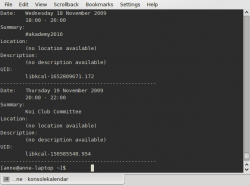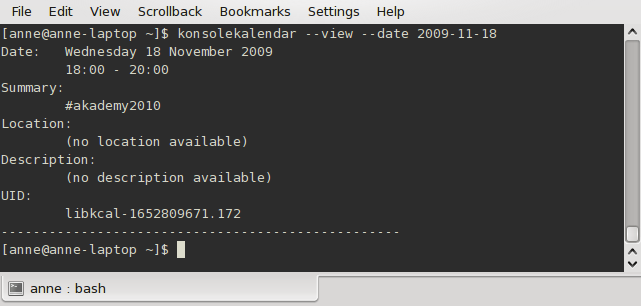KonsoleKalendar: Difference between revisions
Appearance
OpenIDUser53 (talk | contribs) New page: konsolekalendar is an application to administer a calendar without a graphical user interface. konsolekalendar's syntax must be learned first. So, here is a short introduction how you can ... |
RogueScholar (talk | contribs) Update uses of Input template following upgrade to SyntaxHighlight extension |
||
| (7 intermediate revisions by 3 users not shown) | |||
| Line 1: | Line 1: | ||
<languages /> | |||
<translate> | |||
* Add | <!--T:1--> | ||
{|class="tablecenter vertical-centered" | |||
* Show all calendar entries | | [[File:Konsolekalendar-view.png|250px|thumb]] | ||
| '''Use your calendar when you can't use a graphical user interface''' | |||
* | |} | ||
<!--T:2--> | |||
'''konsolekalendar''' is an application to administer a calendar without a graphical user interface. It normally works with the calendar that is marked "Default", if you use '''KOrganizer'''. However, it is possible to create a calendar if you don't have one already. | |||
<!--T:3--> | |||
As it is strictly a command-line application, '''konsolekalendar''''s syntax must be learned first. | |||
<!--T:4--> | |||
Here is a short introduction to using '''konsolekalendar''': | |||
<!--T:5--> | |||
* If you do not already have a calendar set up, you first need to create one: {{Input|lang=shell|1=konsolekalendar --create --file ~/.kde/share/apps/korganizer/vacation.ics}} | |||
<!--T:6--> | |||
:(This location will enable it to be used either in '''konsolekalendar''' or in '''korganizer'''.) | |||
<!--T:7--> | |||
* Add your birthday to the default calendar: {{Input|lang=shell|1=konsolekalendar --add --date 2009-06-06 --summary "My Birthday" --description "Party Time"}} | |||
<!--T:8--> | |||
* Add a vacation: {{Input|lang=shell|1=konsolekalendar --add --file vacation.ics --date 2009-08-01 --end-date 2009-08-07 --summary "Vacation" \ | |||
--description "Nobody will ever find me!"}} | |||
<!--T:9--> | |||
* Show all calendar entries: {{Input|lang=shell|1=konsolekalendar --all 2>errorlog}} | |||
<!--T:10--> | |||
* You probably don't want to do this if you have been using your calendar for long, however, you can specify date ranges, as in… {{Input|lang=shell|1=konsolekalendar --view --date 2009-08-17 --end-date 2009-08-21}} | |||
:…which shows that particular work week. | |||
<!--T:11--> | |||
* Or maybe you only wanted to see the next entry? Then use: {{Input|lang=shell|1=konsolekalendar --next}} | |||
<!--T:12--> | |||
* Or for the week ahead? Try: {{Input|lang=shell|1=konsolekalendar --show-next 7}} | |||
<!--T:13--> | |||
* To show your calendar file, the rubric is: {{Input|lang=shell|1=konsolekalendar --view 2>&1 {{!}} grep resource {{!}} grep konsolekalendar}} | |||
<!--T:14--> | |||
* To edit an entry, use: {{Input|lang=shell|1=konsolekalendar --change --uid libkcal-1652809671.172 --summary "Get my head examined" \ | |||
--description "I must be crazy!!"}} | |||
<!--T:15--> | |||
* Before you can delete an entry, you first need to list it: [[File:Konsolekalendar-list.png|thumb|right|641px]] | |||
<!--T:16--> | |||
:There at the bottom is the UID of the entry. | |||
<!--T:17--> | |||
{{Clear|right}} | |||
:Now you are ready to delete it: {{Input|lang=shell|1=konsolekalendar --delete --uid libkcal-1652809671.172}} | |||
<!--T:18--> | |||
{{Warning|Beware - this is a permanent delete. You cannot recover the entry }} | |||
<!--T:19--> | |||
* Export a calendar; it is possible to export to several formats, including ''CSV'' and ''HTML'': {{Input|lang=shell|1=konsolekalendar --export-type CVS current.ics}} | |||
<!--T:20--> | |||
* Import a calendar: {{Input|lang=shell|1=konsolekalendar --import another.ics --file current.ics}} | |||
<!--T:21--> | |||
:In this case, all the entries from another.ics will be merged into current.ics. | |||
<!--T:22--> | |||
[[Category:Office]] | |||
</translate> | |||
Latest revision as of 11:01, 25 February 2025
 |
Use your calendar when you can't use a graphical user interface |
konsolekalendar is an application to administer a calendar without a graphical user interface. It normally works with the calendar that is marked "Default", if you use KOrganizer. However, it is possible to create a calendar if you don't have one already.
As it is strictly a command-line application, konsolekalendar's syntax must be learned first.
Here is a short introduction to using konsolekalendar:
- If you do not already have a calendar set up, you first need to create one:
konsolekalendar --create --file ~/.kde/share/apps/korganizer/vacation.ics
- (This location will enable it to be used either in konsolekalendar or in korganizer.)
- Add your birthday to the default calendar:
konsolekalendar --add --date 2009-06-06 --summary "My Birthday" --description "Party Time"
- Add a vacation:
konsolekalendar --add --file vacation.ics --date 2009-08-01 --end-date 2009-08-07 --summary "Vacation" \ --description "Nobody will ever find me!"
- Show all calendar entries:
konsolekalendar --all 2>errorlog
- You probably don't want to do this if you have been using your calendar for long, however, you can specify date ranges, as in…
konsolekalendar --view --date 2009-08-17 --end-date 2009-08-21
- …which shows that particular work week.
- Or maybe you only wanted to see the next entry? Then use:
konsolekalendar --next
- Or for the week ahead? Try:
konsolekalendar --show-next 7
- To show your calendar file, the rubric is:
konsolekalendar --view 2>&1 | grep resource | grep konsolekalendar
- To edit an entry, use:
konsolekalendar --change --uid libkcal-1652809671.172 --summary "Get my head examined" \ --description "I must be crazy!!"
- There at the bottom is the UID of the entry.
- Now you are ready to delete it:
konsolekalendar --delete --uid libkcal-1652809671.172
- Export a calendar; it is possible to export to several formats, including CSV and HTML:
konsolekalendar --export-type CVS current.ics
- Import a calendar:
konsolekalendar --import another.ics --file current.ics
- In this case, all the entries from another.ics will be merged into current.ics.


